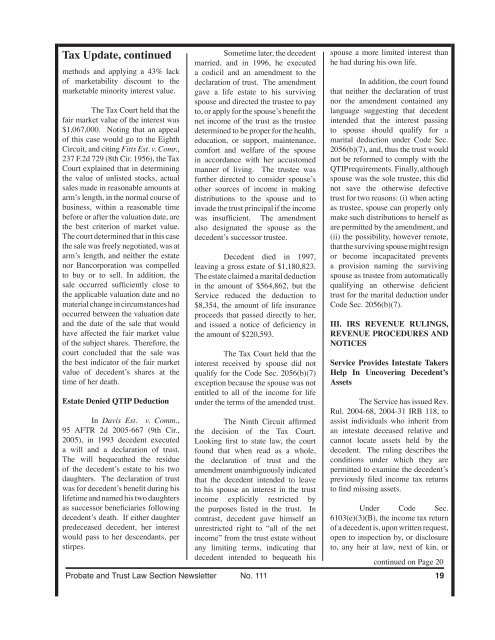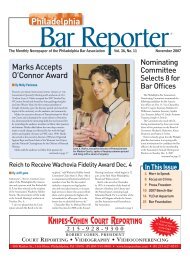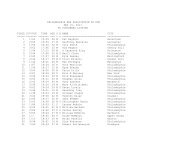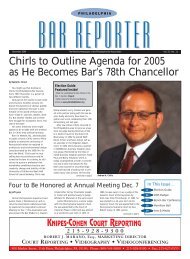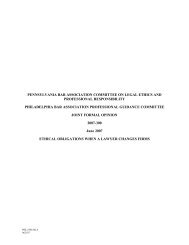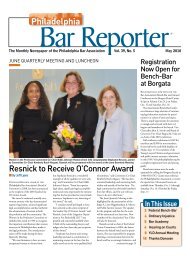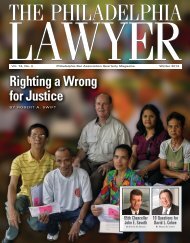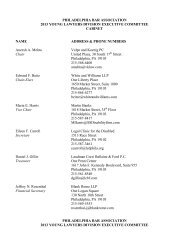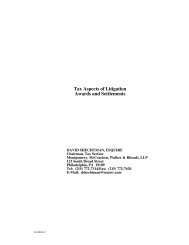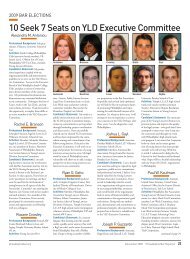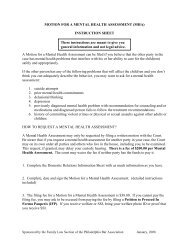Probate & Trust Newsletter: April 2005 - Philadelphia Bar Association
Probate & Trust Newsletter: April 2005 - Philadelphia Bar Association
Probate & Trust Newsletter: April 2005 - Philadelphia Bar Association
You also want an ePaper? Increase the reach of your titles
YUMPU automatically turns print PDFs into web optimized ePapers that Google loves.
Tax Update, continued<br />
methods and applying a 43% lack<br />
of marketability discount to the<br />
marketable minority interest value.<br />
The Tax Court held that the<br />
fair market value of the interest was<br />
$1,067,000. Noting that an appeal<br />
of this case would go to the Eighth<br />
Circuit, and citing Fitts Est. v. Comr.,<br />
237 F.2d 729 (8th Cir. 1956), the Tax<br />
Court explained that in determining<br />
the value of unlisted stocks, actual<br />
sales made in reasonable amounts at<br />
armʼs length, in the normal course of<br />
business, within a reasonable time<br />
before or after the valuation date, are<br />
the best criterion of market value.<br />
The court determined that in this case<br />
the sale was freely negotiated, was at<br />
armʼs length, and neither the estate<br />
nor Bancorporation was compelled<br />
to buy or to sell. In addition, the<br />
sale occurred sufficiently close to<br />
the applicable valuation date and no<br />
material change in circumstances had<br />
occurred between the valuation date<br />
and the date of the sale that would<br />
have affected the fair market value<br />
of the subject shares. Therefore, the<br />
court concluded that the sale was<br />
the best indicator of the fair market<br />
value of decedentʼs shares at the<br />
time of her death.<br />
Estate Denied QTIP Deduction<br />
In Davis Est. v. Comm.,<br />
95 AFTR 2d <strong>2005</strong>-667 (9th Cir.,<br />
<strong>2005</strong>), in 1993 decedent executed<br />
a will and a declaration of trust.<br />
The will bequeathed the residue<br />
of the decedentʼs estate to his two<br />
daughters. The declaration of trust<br />
was for decedentʼs benefit during his<br />
lifetime and named his two daughters<br />
as successor beneficiaries following<br />
decedentʼs death. If either daughter<br />
predeceased decedent, her interest<br />
would pass to her descendants, per<br />
stirpes.<br />
Sometime later, the decedent<br />
married, and in 1996, he executed<br />
a codicil and an amendment to the<br />
declaration of trust. The amendment<br />
gave a life estate to his surviving<br />
spouse and directed the trustee to pay<br />
to, or apply for the spouseʼs benefit the<br />
net income of the trust as the trustee<br />
determined to be proper for the health,<br />
education, or support, maintenance,<br />
comfort and welfare of the spouse<br />
in accordance with her accustomed<br />
manner of living. The trustee was<br />
further directed to consider spouseʼs<br />
other sources of income in making<br />
distributions to the spouse and to<br />
invade the trust principal if the income<br />
was insufficient. The amendment<br />
also designated the spouse as the<br />
decedentʼs successor trustee.<br />
Decedent died in 1997,<br />
leaving a gross estate of $1,180,823.<br />
The estate claimed a marital deduction<br />
in the amount of $564,862, but the<br />
Service reduced the deduction to<br />
$8,354, the amount of life insurance<br />
proceeds that passed directly to her,<br />
and issued a notice of deficiency in<br />
the amount of $220,593.<br />
The Tax Court held that the<br />
interest received by spouse did not<br />
qualify for the Code Sec. 2056(b)(7)<br />
exception because the spouse was not<br />
entitled to all of the income for life<br />
under the terms of the amended trust.<br />
The Ninth Circuit affirmed<br />
the decision of the Tax Court.<br />
Looking first to state law, the court<br />
found that when read as a whole,<br />
the declaration of trust and the<br />
amendment unambiguously indicated<br />
that the decedent intended to leave<br />
to his spouse an interest in the trust<br />
income explicitly restricted by<br />
the purposes listed in the trust. In<br />
contrast, decedent gave himself an<br />
unrestricted right to “all of the net<br />
income” from the trust estate without<br />
any limiting terms, indicating that<br />
decedent intended to bequeath his<br />
spouse a more limited interest than<br />
he had during his own life.<br />
In addition, the court found<br />
that neither the declaration of trust<br />
nor the amendment contained any<br />
language suggesting that decedent<br />
intended that the interest passing<br />
to spouse should qualify for a<br />
marital deduction under Code Sec.<br />
2056(b)(7), and, thus the trust would<br />
not be reformed to comply with the<br />
QTIP requirements. Finally, although<br />
spouse was the sole trustee, this did<br />
not save the otherwise defective<br />
trust for two reasons: (i) when acting<br />
as trustee, spouse can properly only<br />
make such distributions to herself as<br />
are permitted by the amendment, and<br />
(ii) the possibility, however remote,<br />
that the surviving spouse might resign<br />
or become incapacitated prevents<br />
a provision naming the surviving<br />
spouse as trustee from automatically<br />
qualifying an otherwise deficient<br />
trust for the marital deduction under<br />
Code Sec. 2056(b)(7).<br />
III. IRS REVENUE RULINGS,<br />
REVENUE PROCEDURES AND<br />
NOTICES<br />
Service Provides Intestate Takers<br />
Help In Uncovering Decedentʼs<br />
Assets<br />
The Service has issued Rev.<br />
Rul. 2004-68, 2004-31 IRB 118, to<br />
assist individuals who inherit from<br />
an intestate deceased relative and<br />
cannot locate assets held by the<br />
decedent. The ruling describes the<br />
conditions under which they are<br />
permitted to examine the decedentʼs<br />
previously filed income tax returns<br />
to find missing assets.<br />
Under Code Sec.<br />
6103(e)(3)(B), the income tax return<br />
of a decedent is, upon written request,<br />
open to inspection by, or disclosure<br />
to, any heir at law, next of kin, or<br />
continued on Page 20<br />
<strong>Probate</strong> and <strong>Trust</strong> Law Section <strong>Newsletter</strong> No. 111 19


